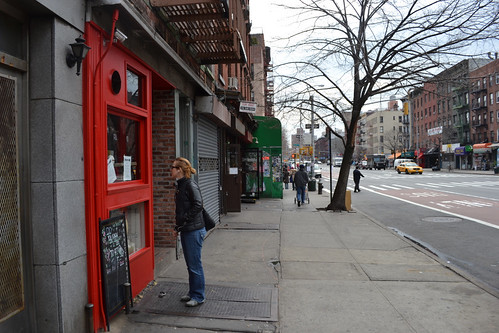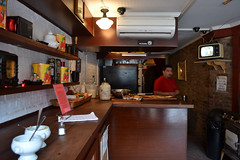 Ian Duncan A passerby inspects South Brooklyn Pizza’s liquor license notice. Despite the hurdles of entering a thoroughly saturated market, owners of bars and restaurants are still flocking to the East Village – and filing applications for liquor licenses.
Ian Duncan A passerby inspects South Brooklyn Pizza’s liquor license notice. Despite the hurdles of entering a thoroughly saturated market, owners of bars and restaurants are still flocking to the East Village – and filing applications for liquor licenses.This weekend, the Post reported what we all kind of knew anyway. The East Village has more places to buy booze than any other neighborhood in the city: 474 in the 10003 zip code by their count. Cue mass eye-rolling in the blogosphere at the non-news.
Concerned by the profusion of bars, Community Board 3 and the authority have started to toughen up. Last month, the board narrowly voted down a liquor license application for a Mexican restaurant run by Two Boots Pizza owner Phil Hartman and music promoter Todd Patrick.
The reason for the proliferation of bars hinges on zoning technicalities and what critics say was the State Liquor Authority’s past trigger-happy attitude to handing out licenses.
That created momentum and now entrepreneurs are desperate to get a foothold in the neighborhood, despite the obstacles. Next Monday, 33 businesses will put their case for new or expanded licenses to the community board.
In a bold step, the owners of South Brooklyn Pizza labeled the community board “infamous” and urged their customers to sign a petition supporting their application. EV Grieve noted the claim, trigging much rumbling from the blog’s commenters.
 Ian Duncan The owners of South Brooklyn Pizza are urging their customers to sign a petition supporting their application for a liquor license.
Ian Duncan The owners of South Brooklyn Pizza are urging their customers to sign a petition supporting their application for a liquor license.The chain, owned by real-estate investor Jim McGown and managed by Ruben Alvan operates a store and pub in Carroll Gardens and bought an empty store next to its First Avenue location last fall. The East Village location opened last year, and failed to get a full liquor license. Now the owners are applying to sell wine and beer at the space next door.
“Everybody wants to be in the East Village if they have the opportunity,” Mr. Alvan said. “It’s a hot spot.”
But, he admitted, he did not think it would so difficult to get a license. Mr. Alvan hopes that if the board grants a wine and beer license he can “earn his keep” in the neighborhood. Mr. Alvan said he has 2,000 names in support of the application, but that number could not be verified. “We just want to be part of the community,” he said.
Mr. Alvan said that the Carroll Garden’s store attracted some attention after it hosted a party for the Brooklyn neighborhood’s gay community. The party approach is not one that they plan to take any longer, Mr. Alvan said. Documents filed with the community board show the owners have no plans to use outside space at the store and will only play music at background level.
Ariel Palitz, a member of the Community Board 3 licensing committee and herself a bar owner described the East Village as “a destination for coolness.” But because of the already high number of bars in the neighborhood, she added that owners need to be prepared and have community support when applying for a license. Ms. Palitz emphasized that she was speaking in a personal capacity, not in her position as a board member.
The density of bars also means that owners are facing increasing competition. In the lingering aftermath of the financial crisis, some owners are still struggling. Richard Dee, who has owned Company Bar on East 10th Street at First Avenue for eight years, said in an effort to drum up business he has resorted to giving away a free drink to every college student who comes through the door.
“It is harder to fill your bar because there’s so many choices,” Ms. Palitz said, “but it’s not impossible.”
Join the conversation: Should more be done to stem the proliferation of bars?



